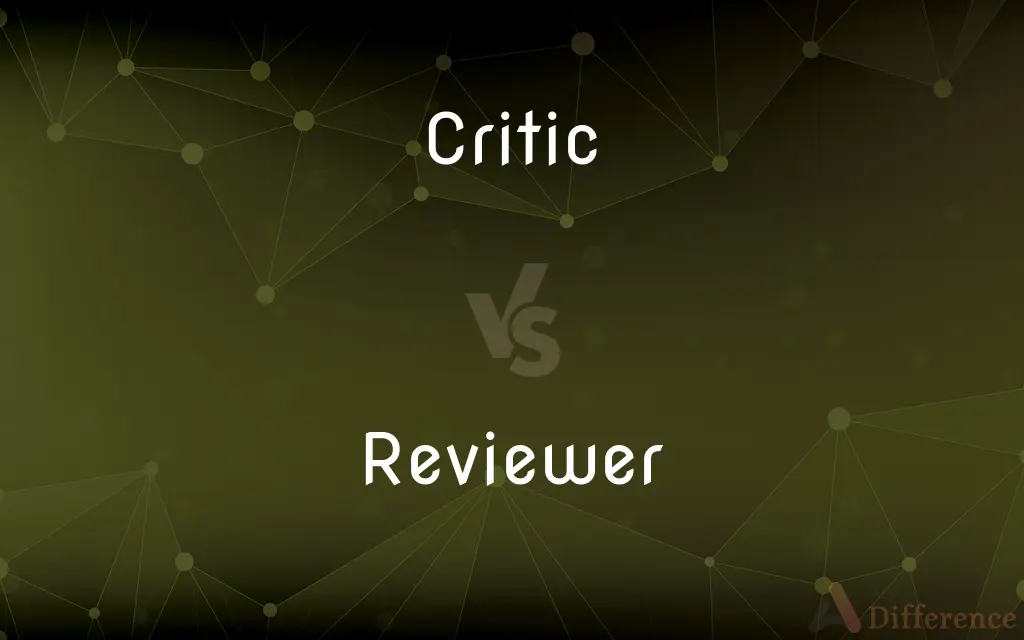Critic vs. Reviewer — What's the Difference?
Edited by Tayyaba Rehman — By Maham Liaqat — Updated on April 9, 2024
A critic offers in-depth analysis and judgment on the merits and faults of artistic works, while a reviewer provides evaluations or summaries of products or experiences, often for consumer guidance.

Difference Between Critic and Reviewer
Table of Contents
ADVERTISEMENT
Key Differences
A critic is typically associated with the arts, including literature, film, music, and theater, offering detailed critiques that delve into the nuances of the work's form, style, and content. On the other hand, a reviewer might cover a wider range of subjects, including consumer products, restaurants, and entertainment options, focusing on providing an assessment that helps the audience make informed decisions.
Critics often employ a specialized vocabulary and theoretical frameworks to dissect works, aiming to influence the field's standards and the audience's appreciation of the art. Reviewers, whereas, prioritize accessibility and practicality, catering to the general public's interests by assessing the quality, utility, and value of the experience or product in question.
While the role of a critic can influence the perception and reception of artistic works within scholarly and cultural discourse, a reviewer's impact is more direct on consumer behavior and market trends.
The distinction between critics and reviewers has blurred with the rise of online platforms and social media, where individuals can assume either role to varying degrees. However, traditional distinctions based on depth of analysis, field of focus, and intended audience still apply.
Critics and reviewers both serve to guide their respective audiences, but the depth, scope, and purpose of their evaluations differ significantly. Critics engage in a form of dialogue with the work and its creators, while reviewers focus on the audience's potential interest or enjoyment.
ADVERTISEMENT
Comparison Chart
Focus
Artistic works (literature, film, music, etc.)
Consumer products, services, experiences
Purpose
Evaluate artistic value and significance
Guide consumer choices
Depth of Analysis
In-depth, often with theoretical frameworks
Practical, experience-based
Vocabulary
Specialized, academic
Accessible, general
Influence
Cultural discourse, artistic standards
Consumer behavior, market trends
Intended Audience
Scholars, art enthusiasts
General public, consumers
Evaluation Criteria
Form, style, content, cultural/historical context
Quality, utility, value, personal experience
Compare with Definitions
Critic
A critic analyzes and judges the merits of literary works.
The critic's review of the novel explored themes of identity and memory.
Reviewer
Reviewers often rate products or experiences for clarity.
The hotel reviewer gave a five-star rating for exceptional service.
Critic
They focus on the artistic value of films.
A film critic dissected the director's use of symbolism.
Reviewer
Their reviews help consumers make informed purchasing decisions.
The car reviewer compared fuel efficiency across models.
Critic
Their critiques often influence public and academic perceptions.
The critic's harsh critique sparked a debate on modern art.
Reviewer
They provide opinions on dining experiences.
The restaurant reviewer praised the innovative use of local ingredients.
Critic
Critics aim to enrich understanding and appreciation of art.
The theater critic's analysis highlighted the play's innovative staging.
Reviewer
Reviewers guide audiences through video game selections.
The game reviewer focused on gameplay mechanics and story depth.
Critic
Critics evaluate music with a deep understanding of its history.
The music critic compared the album to classic jazz recordings.
Reviewer
A reviewer assesses the latest consumer gadgets.
The reviewer recommended the smartphone for its camera quality.
Critic
A critic is a professional who communicates an assessment and an opinion of various forms of creative works such as art, literature, music, cinema, theater, fashion, architecture, and food. Critics may also take as their subject social or government policy.
Reviewer
One who reviews, especially one who writes reviews, as for a newspaper or magazine.
Critic
A person who forms and expresses judgments of the merits, faults, value, or truth of a matter.
Reviewer
A person who writes reviews for a newspaper or other publication; a critic.
Critic
A person who analyzes, evaluates, and reports on creative works, especially as a profession
A film critic.
A food critic.
Reviewer
An inspector.
Critic
A person who tends to make harsh or carping judgments; a faultfinder.
Reviewer
One who reviews or reëxamines; an inspector; one who examines publications critically, and publishes his opinion upon their merits; a professional critic of books.
Critic
A person who appraises the works of others.
Reviewer
Someone who reads manuscripts and judges their suitability for publication
Critic
A specialist in judging works of art.
Reviewer
A writer who reports and analyzes events of the day
Critic
One who criticizes; a person who finds fault.
Critic
An opponent.
Critic
Obsolete form of critique(an act of criticism)
Critic
Obsolete form of critique(the art of criticism)
Critic
To criticise.
Critic
One skilled in judging of the merits of literary or artistic works; a connoisseur; an adept; hence, one who examines literary or artistic works, etc., and passes judgment upon them; a reviewer.
The opininon of the most skillful critics was, that nothing finer [than Goldsmith's "Traveler"] had appeared in verse since the fourth book of the "Dunciad."
Critic
One who passes a rigorous or captious judgment; one who censures or finds fault; a harsh examiner or judge; a caviler; a carper.
When an author has many beauties consistent with virtue, piety, and truth, let not little critics exalt themselves, and shower down their ill nature.
You know who the critics are? the men who have failed in literature and art.
Critic
The art of criticism.
Critic
An act of criticism; a critique.
And make each day a critic on the last.
Critic
Of or pertaining to critics or criticism; critical.
Critic
To criticise; to play the critic.
Nay, if you begin to critic once, we shall never have done.
Critic
A person who is professionally engaged in the analysis and interpretation of works of art
Critic
Anyone who expresses a reasoned judgment of something
Critic
Someone who frequently finds fault or makes harsh and unfair judgments
Common Curiosities
Can someone be both a critic and a reviewer?
Yes, individuals can fulfill both roles, especially in cases where artistic works are also consumer products, like films or music.
How do critics influence the arts?
Critics can shape the reception and interpretation of artistic works, influencing public opinion and scholarly discourse.
Do critics and reviewers use different criteria in their evaluations?
Yes, critics often use criteria like artistic value and historical significance, while reviewers focus on quality, utility, and personal experience.
How do audiences benefit from critics?
Audiences gain a deeper understanding and appreciation of artistic works through critics' analyses and interpretations.
Why are reviewers important to consumers?
Reviewers provide valuable information that helps consumers make informed choices about products, services, and experiences.
What distinguishes a critic from a reviewer?
A critic offers deep, often theoretical analysis of artistic works, while a reviewer provides practical assessments of products or experiences.
What skills are important for a critic?
Critical thinking, deep knowledge of the subject, and the ability to analyze and interpret complex artistic expressions are key skills.
What skills are important for a reviewer?
Practical knowledge of the product or service, the ability to communicate clearly to a broad audience, and experience-based assessment skills are crucial.
How has the internet changed the roles of critics and reviewers?
The internet has blurred the lines between critics and reviewers, allowing more people to publish their analyses and opinions.
How do audiences benefit from reviewers?
Reviewers help audiences navigate the vast array of products and services, making choices that best fit their needs and preferences.
Share Your Discovery

Previous Comparison
Internet vs. Multimedia
Next Comparison
Brute vs. ManAuthor Spotlight
Written by
Maham LiaqatEdited by
Tayyaba RehmanTayyaba Rehman is a distinguished writer, currently serving as a primary contributor to askdifference.com. As a researcher in semantics and etymology, Tayyaba's passion for the complexity of languages and their distinctions has found a perfect home on the platform. Tayyaba delves into the intricacies of language, distinguishing between commonly confused words and phrases, thereby providing clarity for readers worldwide.
















































